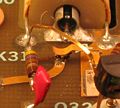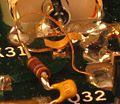7T11: Difference between revisions
No edit summary |
mNo edit summary |
||
| Line 35: | Line 35: | ||
{{Spec | Input impedance (Trig Input) | selectable, 1 MΩ / 50 Ω }} | {{Spec | Input impedance (Trig Input) | selectable, 1 MΩ / 50 Ω }} | ||
{{Spec | Max. input | | {{Spec | Max. input | | ||
* 1 MΩ: 100 V DC or P-P to 1 kHz, | * 1 MΩ: 100 V DC or P-P to 1 kHz, derate at −6 dB/octave above 1 kHz down to 5 V<sub>p-p</sub> | ||
* 50 Ω: 2 V (DC + peak AC) | * 50 Ω: 2 V (DC + peak AC) | ||
}} | }} | ||
{{Spec | Jitter | | {{Spec | Jitter | | ||
* Sequential mode:< 10 ps at fastest sweep, < 0.4 Div otherwise | * Sequential mode: < 10 ps at fastest sweep, < 0.4 Div otherwise | ||
* Random mode: < 30 ps at fastest sweep, 1 Div otherwise | * Random mode: < 30 ps at fastest sweep, 1 Div otherwise | ||
* HF Sync mode: < 20 ps with 12.4 GHz, 200 mV<sub>p-p</sub> signal | * HF Sync mode: < 20 ps with 12.4 GHz, 200 mV<sub>p-p</sub> signal | ||
| Line 47: | Line 47: | ||
==Operation== | ==Operation== | ||
Due its sampling principle (so called undersampling), the 7T11 can only be used on | Due to its sampling principle (so called undersampling), the 7T11 can only be used on | ||
repetitive signals and samples are always taken from signal portions delayed | repetitive signals and samples are always taken from signal portions delayed | ||
from the trigger event. This delay is adjustable on the front panel to select | from the trigger event. This delay is adjustable on the front panel to select | ||
| Line 53: | Line 53: | ||
from undersampling to real-time sampling. | from undersampling to real-time sampling. | ||
To obtain maximum bandwidth, the sampling heads contain no delay lines, | |||
so the 7T11 needs an external pre-trigger if there are random, high-jitter signals | so the 7T11 needs an external pre-trigger if there are random, high-jitter signals | ||
or if the original signal triggered onto needs to be observed. In the special case of | or if the original signal triggered onto needs to be observed. In the special case of | ||
| Line 61: | Line 61: | ||
To display the triggering event without slowing the sweep rate enough to see the next | To display the triggering event without slowing the sweep rate enough to see the next | ||
pulse, the input signal can be delayed by | pulse, the input signal can be delayed by an external delay line such as the [[7M11]]. | ||
X-Y operation is possible up to 14 GHz if one 7S11 resides in the A-horizontal slot | X-Y operation is possible up to 14 GHz if one 7S11 resides in the A-horizontal slot | ||
| Line 70: | Line 70: | ||
Additionally, there is an internal 200 MHz tunnel diode oscillator, | Additionally, there is an internal 200 MHz tunnel diode oscillator, | ||
which can be synchronized from external signals up to 14 GHz. This | which can be synchronized from external signals up to 14 GHz. This | ||
oscillator in turn drives a 10 MHz tunnel diode oscillator that provides | oscillator in turn drives a 10 MHz tunnel diode oscillator that | ||
the internal trigger signal. | provides the internal trigger signal. | ||
The 7T11 uses a [[BSM connector]] for pulse output on the front panel. | The 7T11 uses a [[BSM connector]] for pulse output on the front panel. | ||
Note the 7T11 does not work in a [[7854]] mixed-mode scope because it uses the [[7000 Series plug-in interface|A1 sweep gate signal]] for blanking. The updated 7T11A does since it uses A17 for blanking. | Note the 7T11 does not work in a [[7854]] mixed-mode scope because it uses the | ||
[[7000 Series plug-in interface|A1 sweep gate signal]] for blanking. | |||
The updated 7T11A does since it uses A17 for blanking. | |||
A 7T11 can be [http://www.perdrix.co.uk/7T11Conversion/index.htm field upgraded to 7T11A]. | A 7T11 can be [http://www.perdrix.co.uk/7T11Conversion/index.htm field upgraded to 7T11A]. | ||
Revision as of 01:34, 26 October 2019
The Tektronix 7T11 is a time base plug-in for the 7000-series scopes. It was specially designed to build a sampling oscilloscope configuration together with the 7S11 sampler and one of the sampling head plug-ins.
Because the 7T11 and 7S11 have direct interconnections side by side, they also work in slow mainframes. The 7T11 supports up to two 7S11 for dual channel or X–Y operation.
Key Specifications
| Sweep rate | 50 μs/Div to 10 ps/div, variable speed-up ×2.5 on all ranges (i.e. down to 4 ps/Div) |
|---|---|
| Trigger bandwidth | 500 MHz internal, 1 GHz from external trigger sources, 12.4 GHz in HF Sync mode |
| Trigger sensitivity |
|
| Input impedance (Trig Input) | selectable, 1 MΩ / 50 Ω |
| Max. input |
|
| Jitter |
|
Operation
Due to its sampling principle (so called undersampling), the 7T11 can only be used on repetitive signals and samples are always taken from signal portions delayed from the trigger event. This delay is adjustable on the front panel to select the portion of interest. At the three lowest sweep ranges, the 7T11 changes from undersampling to real-time sampling.
To obtain maximum bandwidth, the sampling heads contain no delay lines, so the 7T11 needs an external pre-trigger if there are random, high-jitter signals or if the original signal triggered onto needs to be observed. In the special case of a periodic signal with low jitter, a random sampling mode can be used so that the signal triggered on can be observed. In this case, an internal PLL locks to the signal and generates an internal pre-trigger.
To display the triggering event without slowing the sweep rate enough to see the next pulse, the input signal can be delayed by an external delay line such as the 7M11.
X-Y operation is possible up to 14 GHz if one 7S11 resides in the A-horizontal slot of a 4-slot mainframe.
Manual or external sweep is possible to connect a slow pen plotter.
Additionally, there is an internal 200 MHz tunnel diode oscillator, which can be synchronized from external signals up to 14 GHz. This oscillator in turn drives a 10 MHz tunnel diode oscillator that provides the internal trigger signal.
The 7T11 uses a BSM connector for pulse output on the front panel.
Note the 7T11 does not work in a 7854 mixed-mode scope because it uses the A1 sweep gate signal for blanking. The updated 7T11A does since it uses A17 for blanking. A 7T11 can be field upgraded to 7T11A.
Links
- Tekscope Vol. 2 No. 1, Feb 1970: Basic Sampling - Introduction of 7T11, 7S11 and 7M11
- Tekscope Vol. 5 No. 2, Mar-Apr 1973: Servicing the 7T11 Trigger Circuit
- Tekscope Vol. 5 No. 3, May-Jun 1973: Servicing the 7T11 Sweep Circuit
Pictures
-
7T11 front
-
7T11 side connection
-
7T11A front
-
-
Right view
-
Left view
-
Trigger board in a 7T11
-
Back side of trigger board
-
Timing board in a 7T11
-
Tunnel Diode CR28 in a 7T11
-
Tunnel Diode CR28 in a 7T11A
-
Arming circuit detail (tunnel diodes CR142, CR152)
Measurements
-
7S11, 7T11, S-4 displaying a 1 GHz sine (smooth mode)
-
7S11, 7T11, S-4 displaying a 1 GHz sine (smooth mode, variable-persistence storage display of a 7613 mainframe)














